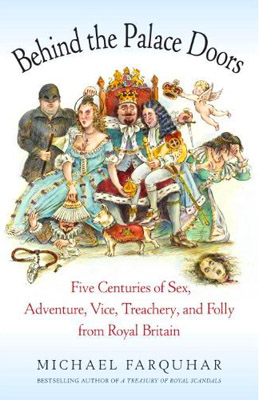Review: Behind the Palace Doors March 10, 2011
Author: Beach Combing | in : Contemporary, Modern , trackback
Behind the Palace Doors: Five Centuries of Sex, Adventure, Vice, Treachery and Folly from Royal Britain by Michael Farquhar has a title that threatens scandal and titillation. But it is fortunately much more than that. It is a brilliantly-written psycho-history of Britain’s royal family – or more accurately families – from the time of Henry VIII through to today, in which the author transcends the anecdotal and tells an epic story of a dynasty and, almost incidentally, of a civilisation.
Now being born into a royal family can never have been good for mental or physical wellbeing – the insanities of court life, the jealousies and dangers of rivals. But in Britain in the last millennium it was a curse that few royals were able to shrug off or rise above. If it was not the defective genes – all that inter-marriage – that did for you, then it was the climate of fear growing up: Edward VI saw his own beloved dog shot when a noble attempted to kidnap him; Princess Elizabeth (later Elizabeth I) believed that she was being taken to execution when a hundred guards arrived at her residence… Personalities were twisted, stretched and, in some cases, broken.
Any book that Michael Faquhar brings out is going to be stylistically perfect, but the beauty of this particular effort is that we see how the nature of the twisting, stretching and breaking changed with the centuries.
From c. 1500 – 1700 we have the murderous phase. British royal family get-togethers were like a Soprano’s finale with nephews, uncles, aunts, mothers and grandmothers knocking each other off.
From c. 1700-1900 there is, instead, the mental phase where different family members, no longer able to dispose of each other with axes (or only rarely), make each other’s lives a misery by sleight of hand, court etiquette and bills in parliament.
Then from 1900- the present there is death by media with the royal family becoming a goldfish bowl into which the whole nation stares driving the fishies mad.
Even when royal power was safely attained and a monarch was popular there was something, well, unreal about the whole existence. Consider courtship. In the sixteenth-century Mary I (aka ‘Bloody Mary’) fell in love with Philip of Spain after seeing a Titian portrait of the Spanish prince. They met only when they were to marry and Philip’s disappointment in Mary and her phantom pregnancies meant that he soon escaped to Spain’s Lowland possessions. Normal couples have sex to have children, to cement a relationship, to make up after a quarrel, to get one up or get one down… Philip and Mary made love for the last time because Philip came back to England needing some English soldiers forhis wars in the Netherlands. Is it any wonder that Mary became a murdering harridan?
Of course, there were those individuals who were probably born ‘a waste of space’ (as Beachcombing’s grandmother would have called them). That great tonto James II, Edward VIII, or the appalling Mary Queen of Scots: note to self – anyone ever lauded by the Romantic movement is bound to be trouble.
But what impressed Beachcombing, seeing so many extraordinary lives run together, is the few who managed to keep their basic integrity while wading or being pushed knee-deep in blood. There are the obvious candidates Elizabeth I, Charles II… But there are ones too that the modern world risks forgetting and that Faquhar does justice to. Gutsy Jane Grey refusing to convert to Catholicism – at 17 – and dying a Protestant martyr. Charles I telling his son Henry, that he, Charles, was about to be decapitated and that Henry must resist any effort to make him king: to which eight-year-old Henry replied ‘I will be torn to pieces first’. Then there is the greatest of all Britain’s constitutional monarchs, Elizabeth II: born with a modest personality, brought up to serve, she has had the wisdom to remain within the limits of the institutions handed down to her by her father and those institutions have (largely) protected her
Beachcombing to his infinite regret lives in a republican age where Europe’s constitutional monarchs are just a referendum away from presidents and other politicized, bungling, self-centred mediocrities. The future of the British monarchy will depend on whether Elizabeth’s heirs have the wisdom to follow her example. The signs are not good…
Beachcombing is always on the look out for unusual reads: drbeachcombing AT yahoo DOT com



